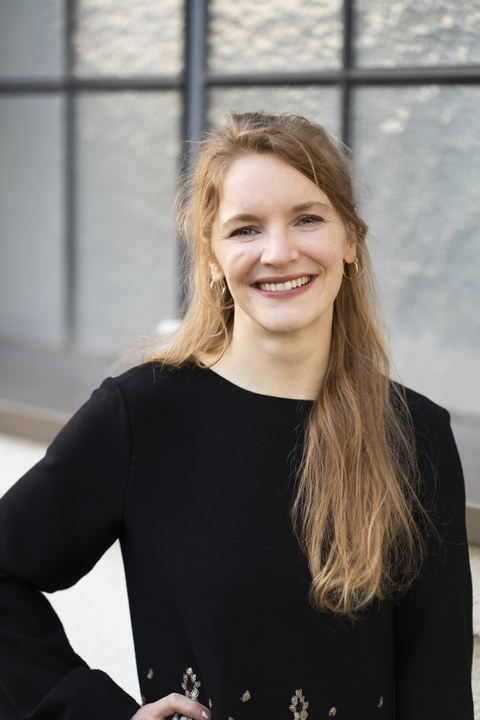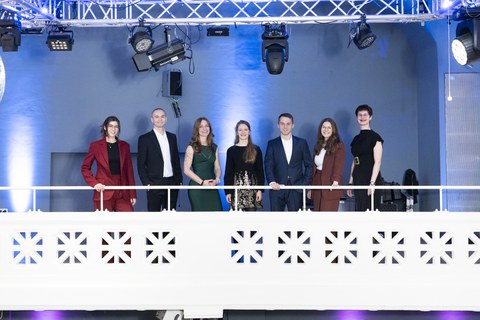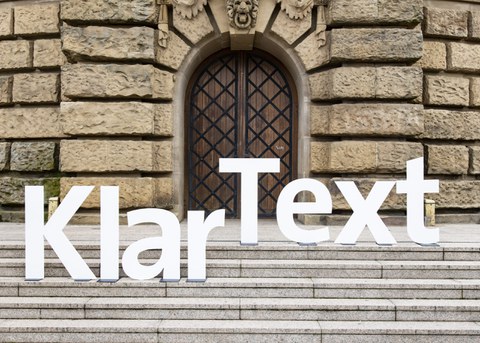Nov 14, 2025
Recognition for outstanding science communication – Klaus Tschira Foundation honors Dr. Annika Konrad with the 2025 KlarText Prize
Comprehensible research in the spotlight: Dr. Annika Konrad, Research Associate at the Chair of Clinical Psychology and Behavioral Neuroscience at TUD Dresden University of Technology, is one of the eight winners of the 2025 KlarText Prize for Science Communication. On November 13, 2025, she received the award in the category “Neuroscience” for her doctoral thesis at an award ceremony held by the Klaus Tschira Foundation in Heidelberg. The award comes with prize money of EUR 7,500. Konrad prevailed against nearly 200 applicants in a highly competitive, three-stage evaluation process.

TUD scientist Dr. Annika Konrad.
"I am thrilled to have received this honor. The prize recognizes the ability to communicate scientific results in a way that is understandable and accessible to everyone,“ explains TUD prize winner Konrad. The fact that this is often neglected in everyday scientific life or only receives secondary attention makes it all the more gratifying when this work is recognized.”
In her prize-winning dissertation, Annika Konrad demonstrated that empathy is central to emotional closeness, but in extreme cases can also be stressful. Using functional magnetic resonance imaging, she was able to show that both very low and very high empathy-associated activity in the brain region known as the “insular cortex” was associated with more stress.
“My findings therefore indicate that in certain individuals, low or very high levels of empathy can lead to psychological distress and do not always result in feeling ‘emotionally connected’ to other people,” explains Konrad. Emotionally isolating oneself from others or empathizing too strongly could therefore increase the risk of psychological stress.
Video: At work with ... Neuroscientist Philipp Kanske
How does our brain control interpersonal interaction? And what happens in the brain when this goes wrong? Dr. Annika Konrad is part of Prof. Philipp Kanske's team. Her research aims to contribute to improving therapies for mental disorders.
© Tobias Ritz / TU Dresden
Background: KlarText Prize for Science Communication from the Klaus Tschira Foundation
"What exactly is your dissertation about? The Klaus Tschira Foundation has awarded the KlarText Prize for Science Communication to the best answers to this question. Doctoral candidates were asked to summarize the results of their doctoral thesis in a short article in a way that was easy to understand. The foundation also awarded a prize for the best infographic. The research topics of the prize winners covered a broad spectrum: biology, chemistry, geosciences, computer science, mathematics, physics, and neuroscience.
About the Klaus Tschira Foundation
The Klaus Tschira Foundation (KTS) promotes the natural sciences, mathematics, and computer science and aims to contribute to the appreciation of these subjects. It was established in 1995 by physicist and SAP co-founder Klaus Tschira (1940–2015) using private funds. Its three main areas of funding are: education, research, and science communication. Its nationwide commitment begins in kindergarten and continues in schools, universities, and research institutions. The foundation is committed to promoting dialogue between science and society.
Contact:
TU Dresden
Press Office
Tel.: +49 351 463-32398
Email:
Klaus Tschira Foundation
Rebecca Käppler
Tel.: +49 6221 533-145
Email:


